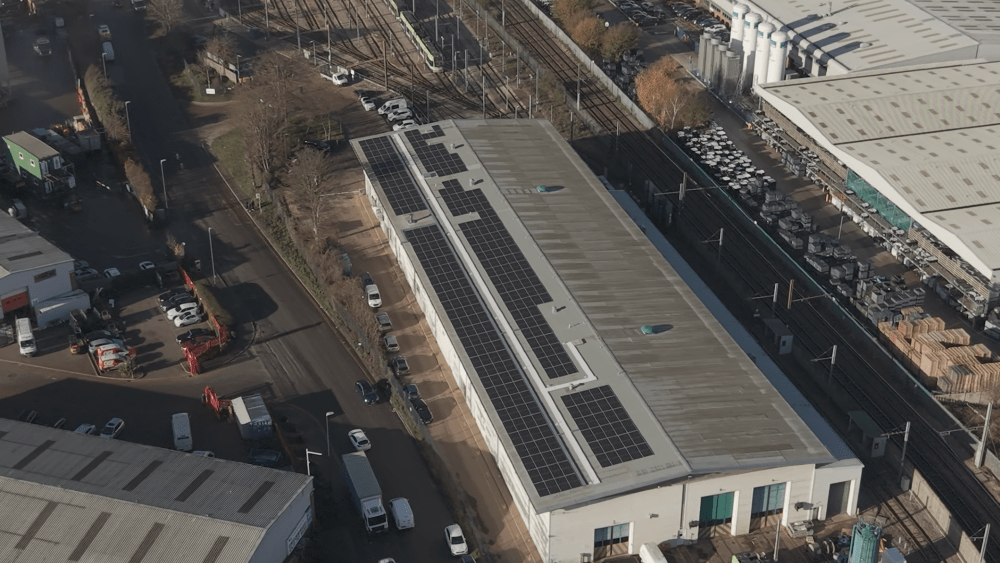The UK Government’s wide-ranging Industrial Strategy has included the potential for large scale, multi-billion pound investment into the transport and energy sectors for the next 10 years.
In the energy industry, grid upgrades and created a decarbonised energy network have formed a central plank, alongside providing additional support for manufacturing sectors which are hard hit by the currently high energy prices.
The strategy includes a doubling in investment in clean energy industries by 2035, with Aberdeen-headquartered Great British Energy helping to build the clean power revolution in Britain with a further £700 million in clean energy supply chains, taking the total funding for the Great British Energy Supply Chain fund to £1 billion.
In addition, a £200 million development funding has been given to advance the Acorn Carbon Capture and Storage project in Scotland, capitalising on expertise in the oil and gas sector around Aberdeen.
Up to £185 million has also been allocated to Scotland through the Clean Industry Bonus, unlocking up to £3.5 billion private sector investment in ports and high-tech components needed to build floating and fixed offshore wind farms.
For transport, there is a Drive35 £2.5bn auto capital and research and development fund, as part of the focus on advanced manufacturing, to deliver growth in the automotive sector. Overall for Advanced Manufacturing, there is up to £4.3 billion in funding, including up to £2.8 billion in R&D over the next five years, with the aim of anchoring supply chains in the UK – from increasing vehicle production to 1.35 million to leading the next generation of technologies for zero emission flight.
Following the announcement, the SMMT said that it had created its own 10 point plan to ensure the UK is in the top 15 global vehicle manufacturing locations by 2030 – and deliver £50bn economic growth over the next decade.
It said that reduced electricity costs and business rates, reformed capital allowances and a reskilled workforce, would ensure “the sector’s competitive edge would be restored”, providing the additional £50bn economic windfall and delivering the UK’s net zero ambitions.
It also published a roadmap for bus, coach and heavy-duty vehicle decarbonisation, co-developed with industry, that aimed to ensure everyone had a ‘right to charge’ by mandating the delivery of public charging and refuelling infrastructure across the UK.
The UK Government’s Industrial Strategy also included:
- Reducing electricity costs by up to 25% from 2027 for electricity-intensive manufacturers
- Increasing British Business Bank financial capacity to £25.6 billion.
- Reducing regulatory burdens by cutting the administrative costs of regulation for business by 25%
- Supporting 5,500 more SMEs to adopt new technology through the Made Smarter programme
- Boosting R&D spending to £22.6bn per year by 2029-30, including cash for autonomous vehicles.
- A new £600m Strategic Sites Accelerator, at six locations to be chosen across the UK
- Strengthening existing Industrial Strategy Zones
- Delivering AI Growth Zones to attract investment in AI infrastructure.
- The Local Innovation Partnerships Fund offering at least £30m for Scotland
Responding to the Strategy, the Director of Policy and External Affairs for Energy Networks Association, Dr. Alexandra Howe said:
“By recognising the central, long term role energy networks play in enabling growth and the transition to a decarbonised economy, the Government today has set its bold industrial strategy on the right course.
“To deliver the new infrastructure needed, upgrade existing infrastructure and maintain a resilient grid, energy networks need to continue to attract long term investment and ensure the planning process does not unnecessarily delay critical national projects.
“We stand ready to work closely with the Government on specific priorities, to make sure network development is rapid, realistic and targeted to exactly what the UK’s homes and businesses require. This renewed focus on enabling us to create a grid for the future can help networks to mobilise investment into communities across the UK.”
Mike Hawes, SMMT Chief Executive, said:
“We welcome the Government’s Industrial Strategy, a 10-year plan which answers our call for a long-term commitment to automotive manufacturing. With action to reduce electricity costs, upskill workers and unlock finance, it lays the foundation on which we can build our future.
“We now need to see the Strategy implemented and at pace, because competitors will move fast so our window of opportunity will not remain open for long. The prize, however, in terms of jobs, innovation and economic growth – green growth at that – is worth the investment.”
Yselkla Farmer, Chief Executive of BEAMA, comments:
“The UK is still home to a wide range of manufacturers of clean energy products and today’s announcements will draw on this first-class expertise as we enter a new period of industrial growth.
“We are especially pleased to see the level of financial support being targeted for BEAMA sectors through GB Energy, the National Wealth Fund and the British Business Bank. Our hope is this can help bring forward investment in UK manufacturing to supply the UK’s electrification needs across the grid and in homes. The decision to reduce electricity costs for the IS-8 manufacturing sectors is an incredibly welcome step as we strive to ensure we can compete for investment globally.
“Our shared objective should be to deliver sustainable, long-term policies that lead to stable growth in local manufacturing, without disrupting what is also currently a very global and integrated supply chain.
“That is why BEAMA is proud to be driving a Grid Industrial Growth Plan for the Transmission and Distribution infrastructure sector, alongside other industry supply chain representatives and Government. This will allow us to identify our manufacturing strengths and target incentives to capitalise on the greatest opportunities available.
“The forthcoming trade and industrial decarbonisation plans are also essential elements of this industrial strategy which we are pleased to be working on with Government.”
Erika Wilson, Managing Director of Wilson Power Solutions and BEAMA President, said:
“The ten-year industrial plan represents a significant and welcome development for our sector, marking the most substantial collaboration between government and industry to date. It paves the way for a more stable and attractive investment environment. At Wilson Power Solutions, we are particularly encouraged by the emphasis on the transmission and distribution networks, the backbone of electrification. As a transformer manufacturer, our equipment plays a critical role in enabling the connection of renewable energy sources, battery storage systems, and data centres to the grid.
“While we may not directly benefit from the proposed energy bill reductions, we commend the strategy’s focus on addressing the industry-wide skills gap, a persistent challenge for us in recent years. We strongly support efforts to attract global talent to the UK, facilitating knowledge transfer and workforce development. We urge the government to prioritise action on this front, as these skills are needed now.
“In line with these ambitions, we are investing in our manufacturing capabilities both domestically and internationally to remain competitive and secure our supply chain in support of the UK’s decarbonisation agenda. We encourage the government to maintain close dialogue with our industry to ensure the successful delivery of this strategy and to keep us on track toward achieving a clean power system by 2030.”
Richard Earl, Director of Research & Development at EO Charging and BEAMA Vice President, said:
““The Government’s Industrial Strategy should be welcomed as a pivotal policy for EVs and EV Charging Infrastructure.
“The EV & Charging Industry has repeatedly raised concerns about high electricity costs, unstable legislation, slow grid connections, and a lack of skills that has hindered the decarbonisation of transport in recent years.
“I’m pleased that this Industrial Strategy sets out to address these issues head on, providing the clarity, coordination and commitment from Government to businesses that has been desperately needed.
“We’ve seen from economies like China that long-term planning is critical to the success of their Electric Vehicle market. Therefore it’s a relief that the UK now has a 10 year plan in place to drive the growth in the critical automotive and clean energy sectors.
“The coordinated approach across energy cost reduction, focus on strategic industries, regional development and export strategies lay the foundations to allow the UK to lead the world in decarbonising transport.””
John Griffiths, CEO, Lucy Electric commented:
“The industrial strategy announced today, addresses key issues impacting our electrical sector such as skills, innovation, and infrastructure. Bold decisions and commitments are needed now to secure investment quickly and ensure the lowest possible cost to UK customers. The longer we delay on subsequent policy and regulatory changes, the steeper the hill we must climb to meet targets and grow the UK’s green economy. The investment required to meet these targets simply cannot happen overnight.
“With electricity demand projected to double by 2050, resulting in a tenfold increase for electrification products in some sectors, visibility on demand is crucial. As a key supply chain partner, we urgently need clarity and certainty to invest in the UK market and scale up our operations. The role of the supply chain cannot be overlooked as our equipment forms crucial links in the network that enable clean power across the country. We stand ready to engage with government and industry partners to deliver our shared goals of decarbonisation and industrial growth.”
Kevin Green, policy director at business group Logistics UK, said:
“Today’s Industrial Strategy recognises the critical importance of the logistics sector in helping to deliver the government’s growth plans. Logistics is integral to all parts of the economy – indeed, nothing moves without it, and our members supply our hospitals, schools, factories, shops and homes with everything they need, everywhere, every day.
“While it is disappointing that our sector has not been named as “foundational”, we welcome the fact that an efficient logistics system has been identified as critical to boosting UK productivity. We will continue to engage closely with the government to drive the economy forwards, including on its new plan for freight and logistics and by pressing for inclusion in the work of the new Supply Chain Centre, the new grid Connections Accelerator Service and Growth and Skills Levy reforms.”
Kate Jennings, CEO of ACE Group, said:
“Our sector has made huge strides to meet the aims outlined in the strategy, to be the world’s most trusted advisers to global industry. We provide not just design and delivery, but strategic thinking, governance frameworks and innovation – in short, the tools and trust needed to build future economies.
“Following last week’s Infrastructure Strategy and today’s £100m investment in engineering skills, alongside 65,000 new courses in engineering and digital, investors now have greater certainty and a clearer framework to drive business growth across the UK.
“We welcome the strategy’s ambition to harness British excellence. What’s vital now is ensuring continuity, not just in policy, but in procurement, skills investment, and export support. We have the knowledge, the networks and the track record. Let’s now turn that into delivery.”
Cllr Adam Hug, Chair of the Local Government Association’s Local Infrastructure and Net Zero Board, said:
“Councils have a critical and unique role in delivering local inclusive growth across all sectors and communities, working closely with businesses, supporting jobseekers, planning regeneration and improving infrastructure.
“It is clear the Government’s ambitions in its Industrial Strategy for national economic growth are only achievable if every local economy is firing on all cylinders.
“Providing sufficient funding so that all councils, including those not in combined authority areas, can deliver local growth priorities will be essential to realising the full potential of Growth Plans, Industrial Strategy Zones and other ambitions identified in this strategy.”












